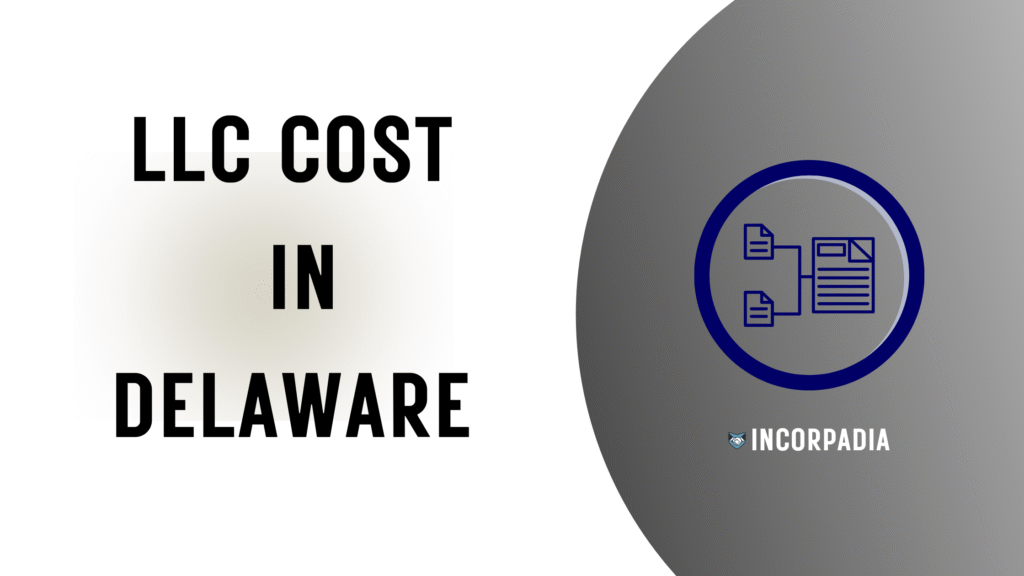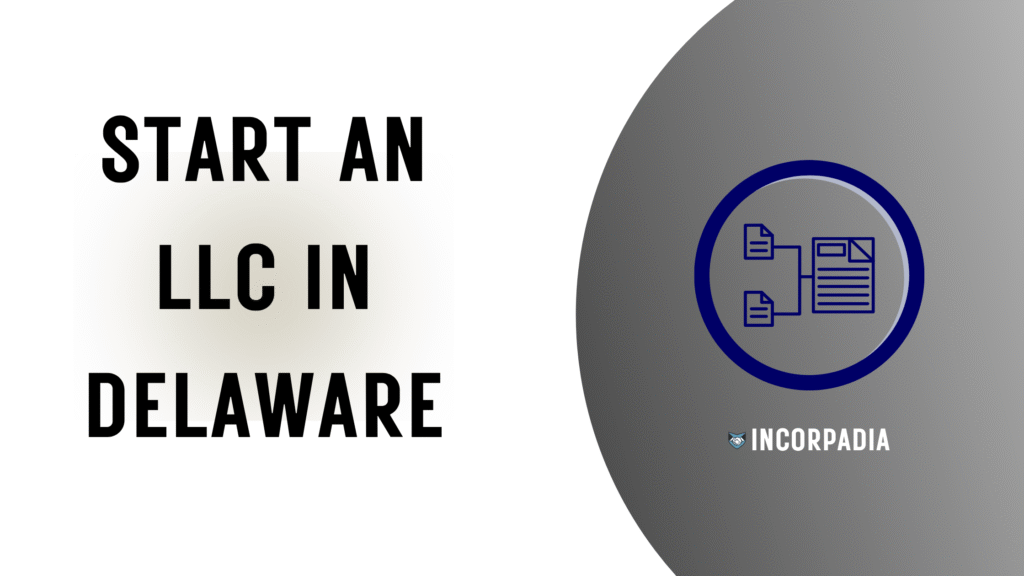Thinking of starting a business in 2025? Delaware is one of the most popular states in the U.S. to form a Limited Liability Company, or LLC. Whether you live in Delaware or not, you can create a Delaware LLC and take advantage of the state’s business-friendly laws, fast processing times, and strong privacy protections.
This guide breaks down each step clearly so you know exactly what to do—and what to expect. Let’s get started.
Costs to File an LLC in Delaware
| Expense | Cost |
|---|---|
| Delaware LLC Formation Fee | $90 (one-time) |
| Registered Agent Fee | $50–$300/year (depending on the service) |
| Annual Franchise Tax | Minimum $300/year |
| Annual Report Fee | $300/year |
| Operating Agreement (optional) | $0–$100 (if you hire a service) |
Steps to forming an LLC in Delaware
Starting an LLC in Delaware isn’t complicated, but there are some critical details to get right. Here’s what the process looks like from start to finish.
1. Search your LLC Name
Your business name is one of the most important parts of starting a company. In Delaware, the name must follow some basic rules:
- It must be unique and not too similar to an existing business name already registered in Delaware.
- It must include the words “Limited Liability Company” or an abbreviation like “LLC” or “L.L.C.”
- It cannot contain restricted words like “bank,” “insurance,” or “university” unless you have special approval.
You can check name availability on the Delaware Division of Corporations website. If your name is available, you’re free to use it. If you want to hold the name while you finish other steps, you can file a Name Reservation form for a small fee. This gives you 120 days of protection on that name.
2. Choose a Delaware Registered Agent
Delaware law requires every LLC to designate a registered agent. This is someone (or a company) who receives legal documents and government notices on behalf of your business.
Who can be an LLC Registered Agent?
- Any individual who lives in Delaware and has a physical street address can be your agent.
- You can also hire a professional registered agent service. These companies accept mail and legal notices for you, then forward them to you online or by mail.
- You cannot use a PO Box as a registered agent address.
- The agent must be available during regular business hours (Monday through Friday, 9 AM to 5 PM).
If you don’t live in Delaware, you’ll need to use a professional registered agent. Even if you do live in the state, many business owners still use a service for privacy reasons. When you list a registered agent service, their address is public—not yours.
We recommend Northwest Registered Agent
Northwest is one of the most highly-rated registered agent services in the U.S. They are known for their strong customer support, reliable service, and privacy-first approach. Many entrepreneurs prefer them because they don’t sell your data, they’re easy to reach, and their pricing is straightforward.
They’ll also help you form your LLC and include registered agent service with the package.
3. File Delaware Certificate of Formation
This is the main document you’ll file with the state to officially create your LLC. In Delaware, it’s called the “Certificate of Formation.” You can file it online or by mail.
The Certificate of Formation includes:
- Your LLC’s name
- The name and address of your registered agent
- The signature of the authorized person forming the LLC
The filing fee is $110, and processing usually takes around 10 business days. Expedited service is available for an extra fee if you need it faster.
Once approved, you’ll receive a stamped copy back from the state. This is your official proof that your LLC exists.
4. Create an LLC Operating Agreement
Although Delaware does not require LLCs to have an Operating Agreement, it’s a smart idea to write one. This is an internal document that outlines how your company is run and managed. It’s especially important if your LLC has more than one member.
A good Operating Agreement includes:
- The names of the owners (called “members”)
- How profits and losses are divided
- Who manages the business
- Rules for meetings and voting
- Procedures for adding or removing members
- What happens if the business dissolves
Even if you’re the only owner, having this document helps maintain your LLC’s limited liability status and shows that your business is being operated properly.
5. Get an EIN for your LLC
The next step is to get an Employer Identification Number (EIN) from the IRS. This number is like a Social Security number for your business and is used to file taxes, open a bank account, and hire employees.
You can apply for an EIN online through the IRS website. It’s free and only takes a few minutes. Some LLC formation companies will also get an EIN for you, but they may charge a service fee.
You’ll need your EIN to:
- Open a business bank account
- Apply for business licenses
- File state and federal taxes
- Hire employees
Make sure to store your EIN in a safe place after receiving it.
6. Delaware Business Licenses and Permits
After forming your LLC, you may need licenses and permits depending on your industry and location.
Here are common examples:
- A general business license, required for most businesses operating in Delaware
- Sales tax license if you sell goods or taxable services
- Local licenses from your city or county
- Professional licenses (doctors, lawyers, contractors, etc.)
You can apply for a general business license through the Delaware One Stop portal. Fees vary depending on the type of business and whether you’re operating in certain cities or counties.
Failure to obtain the proper licenses can result in fines or business suspension, so take time to research which ones you need.
What do I do after my LLC is approved?
Once your LLC is officially approved, here’s what you should do next to keep your company compliant and set up for success.
Open a Business Bank Account
Keep your personal and business finances separate by opening a dedicated business bank account. Most banks will ask for:
- A copy of your Certificate of Formation
- Your EIN from the IRS
- Your LLC Operating Agreement
Using a separate bank account helps protect your limited liability and makes bookkeeping easier during tax time.
Keep Company Records
Even if Delaware doesn’t require regular meetings or filings, it’s still a good idea to maintain records such as:
- Minutes of meetings (if you have partners)
- Membership certificates (if applicable)
- Signed Operating Agreement
- Copies of contracts, invoices, and tax documents
Staying organized shows that your LLC is operating professionally and can help in case of audits or legal disputes.
Pay the Annual Franchise Tax
Delaware LLCs don’t have to file an annual report, but they must pay an annual franchise tax. The tax is a flat fee of $300, regardless of how much money your business made.
How much does a Delaware Annual Franchise Tax Report cost?
The cost is a fixed $300 per year. There are no tiered rates based on income or assets for LLCs.
When is the Annual Franchise Tax Report due?
It’s due every year on June 1. Even if your LLC didn’t do any business or made no income, you must still pay the tax to remain in good standing.
When is my first Annual Franchise Tax Report due?
If you form your LLC in 2025, your first tax payment is due on June 1, 2026.
How do I file my LLC Annual Franchise Tax Report?
You can file and pay the tax online through Delaware’s official website. You’ll need your LLC’s file number and payment method.
Missing this payment results in a $200 late penalty and interest charges, so it’s important to mark your calendar.
How will my LLC be taxed?
By default, your LLC is considered a “pass-through” entity. This means the LLC itself doesn’t pay federal income tax. Instead, profits and losses are passed through to the owners and reported on their personal tax returns.
Here’s how it works:
- A single-member LLC is taxed as a sole proprietorship.
- A multi-member LLC is taxed as a partnership.
- You can also choose to be taxed as an S Corporation or C Corporation by filing the appropriate forms with the IRS.
At the state level, Delaware doesn’t tax LLC income unless the business has physical operations or employees in the state. However, if you have Delaware-based income, you may also need to file a state tax return.
Final Thoughts
Starting an LLC in Delaware in 2025 is a smart move for many entrepreneurs, whether you’re launching a startup, running an online business, or setting up an investment company. The process is straightforward, the tax rules are business-friendly, and you don’t even have to live in the state.
While it’s possible to handle everything yourself, many people use a registered agent service to simplify the process and ensure they stay compliant. Just make sure to track your annual obligations—especially the $300 franchise tax due every June—and keep your paperwork organized.
Once your Delaware LLC is up and running, you’ll be officially in business—and ready to grow.
FAQs
Can I form a Delaware LLC if I don’t live in the state?
Yes. You don’t have to live in Delaware or even in the U.S. to form an LLC there. You just need to appoint a Delaware-based registered agent.
How long does it take to form an LLC in Delaware?
Standard processing usually takes 10 business days. Expedited options can speed this up to 1 or 2 days for an extra fee.
Do I need a lawyer to start an LLC?
Not necessarily. Many people handle it themselves or use a professional service. However, if you’re unsure about legal or tax matters, it’s wise to consult a lawyer or accountant.
Can I change my LLC name later?
Yes. You’ll need to file a Certificate of Amendment and pay a small fee to update your LLC’s name.
What is a Series LLC and can I form one in Delaware?
A Series LLC is a special type of LLC that allows you to create multiple “series” or divisions under one umbrella company. Delaware does allow this, but it’s more complex and may not be the right fit for every business.
What happens if I don’t pay the franchise tax?
You’ll face a $200 penalty and interest on the unpaid amount. Your LLC will also fall out of good standing, which can prevent you from legally operating, getting financing, or expanding.
Do I have to hire employees to form an LLC?
No. You can operate an LLC by yourself. If you do hire employees, you’ll need to register for state and federal employment taxes.







